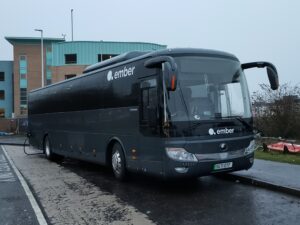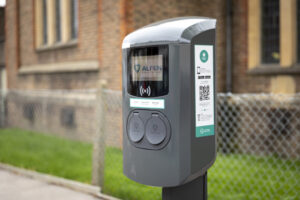Rise of ‘on demand’ services negatively affecting bus usage, report finds
A shift towards personalised and ‘on demand’ services such as the ride-hailing service Uber is a key factor in the decline of bus use in the UK, a new report has found.
The report by The Urban Transport Group, the network of UK city region transport authorities, identified rising bus prices, changing travel habits, and demographic and economic shifts as factors that have led to an ‘alarming’ overall reduction in bus services and bus use across the country.
The report, What’s driving bus patronage change? An analysis of the evidence base, has looked into some of the trends behind bus patronage decline, highlighting new alternatives to riding the bus and a shift in public attitude towards bus travel.
While the report noted that buses are suffering as a result of these trends, it also highlighted areas in which bus use remains high or is even growing, such as Reading, Brighton and Bristol.
Jonathan Bray, director at Urban Transport Group, said: ‘Our initial findings are that many – but by no means all – of the wider social, economic and technological trends that are transforming the way people live their lives are creating a tough environment for the bus.’
‘However, we have also found some common factors for where bus use is high or where the bus is bouncing back, which we aim to explore further in the year ahead.’

While buses remain the most used form of public transport in Britain – accounting for 59% of all public transport journeys in 2016-17 – bus patronage has been in decline for decades as car ownership has become more affordable.
This decline has been particularly clear in the 21st century, with a 23% reduction in the number of trips per head by bus outside of London since 2002.
The Urban Transport Group’s report found that older people, in particular, are turning towards car ownership as they are retiring at a later age, delaying their access to a free bus pass.
Rising fares and inconsistent journey times have also played their part in buses’ decline, with private hire vehicles, rail services and trams seeing the benefit instead.
However, urban areas such as Reading, Brighton and Bristol are bucking the trend, as the report noted that all three cities had affordable, good quality bus services that operate 24 hours a day.
Denser urban areas like London or areas where car travel is unattractive due to congestion or parking are also still seeing high or rising levels of bus use, the report found.
‘If the bus can provide a more rapid and reliable service than alternative means of making the same journey, then this is clearly a positive for the bus,’ the report read.
The Urban Transport Group has already appointed transport consultancy SYSTRA as part of a new research programme following the report.
The group will now begin investigating how people respond to the experience of bus travel and the implications this may have for the future of bus services.
In related news, Reading Borough Council and Reading Buses recently secured £1.53m of Government funding to upgrade 96 buses to an ultra-low emission bus standard (ULEB).
ULEBs are those that have no exhaust emissions, such as electric buses, or have significantly reduced pollution emissions such as Euro 6 diesel buses, gas powered and electric hybrid buses.
Reading were one of the 33 local authorities ordered by the Government to draw up plans for how they would tackle air pollution as they were identified as having roads, or sections of roads, which would exceed limits after 2019.















